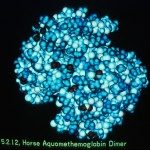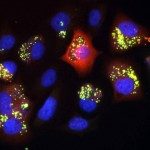Lien vers Pubmed [PMID] – 17869195
Biochim Biophys Acta 2008 Jan; 1784(1): 193-202
Reversible protein phosphorylation is a major regulation mechanism of fundamental biological processes, not only in eukaryotes but also in bacteria. A growing body of evidence suggests that Ser/Thr phosphorylation play important roles in the physiology and virulence of Mycobacterium tuberculosis, the etiological agent of tuberculosis. This pathogen uses ‘eukaryotic-like’ Ser/Thr protein kinases and phosphatases not only to regulate many intracellular metabolic processes, but also to interfere with signaling pathways of the infected host cell. Disrupting such processes by means of selective inhibitors may thus provide new pharmaceutical weapons to combat the disease. Here we review the current knowledge on Ser/Thr protein kinases and phosphatases in M. tuberculosis, their regulation mechanisms and putative substrates, and we explore their therapeutic potential as possible targets for the development of new anti-mycobacterial compounds.





